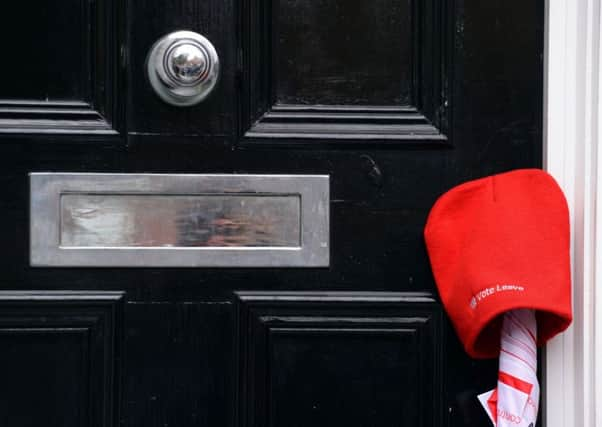YP Comment: Tories turn on Prime Minister. Theresa May's key role in EU vote


Yet his relatively low-key question on Parliamentary sovereignty prompted such a withering response from David Cameron – the PM said this deal would safeguard the authority of the House of Commons after earlier debunking Mr Johnson’s suggestion for a second referendum – that the scale of Tory disunity was clear to see.
Despite the Out campaign hailing Mr Johnson’s endorsement as a high-profile publicity coup which could transform the campaign, it would be remiss not to point out that the Eurosceptic Foreign Secretary, Chancellor and Home Secretary, the occupants of the “Great Offices of State”, are all backing the PM. The latter’s support is significant – Theresa May, who sat alongside Mr Cameron in the Commons, is the politician who has grappled with immigration on a daily basis for six years. Given this, she must have good reason for believing that the EU offers greater safeguards rather than the UK going it alone and risking France, for example, no longer allowing the UK to carry out customs checks at Calais which remains besieged by migrants. Her justification could be critical to the referendum’s outcome.
Advertisement
Hide AdAdvertisement
Hide AdYet the wider political machinations could not be ignored as rebellious Conservative MPs signalled their intention to defy their leader. Whatever happens, and Mr Cameron is by no means assured of victory, the deep splits will remain long after the referendum. The only difference, compared to the Tory tumult over the Maastricht Treaty’s ratification in the early 1990s, is that Labour is not united and is bereft of credibility under Jeremy Corbyn. It’s not much of a consolation as the Government prepares to tear itself apart.
Paying the price: Upkeep of Victorian town halls
THIS is not the first time that the cost of Leeds Town Hall has spiralled out of control – this imposing building, an enduring symbol of civic pride, was beset by money problems when constructed in the 1850s. The backdrop to Winston Churchill’s galvanising speech to the people of Leeds in 1942 and, more recently, the venue for the banquet to launch the Grand Départ, it is more likely to play host to music concerts today than great political gatherings – the city council’s seat of power is now in the nearby Leeds Civic Hall.
Yet this Victorian building, like so many civic halls, is now proving to be a drain on the public purse as time catches up with maintenance work. In the week when Leeds councillors are due to implement a four per cent council tax increase, the latest improvements could now cost £10m – three times more than the original estimate.
Even if the council obtains a lottery grant, it is still a significant sum. And given that this juxtaposition raises perennial questions about whether councillors should be prioritising services like social care, or a property portfolio dating back to Victorian times, it is a reminder about the need for local authorities to move with the times when it comes to raising the finance to pay for the upkeep of such buildings.
Advertisement
Hide AdAdvertisement
Hide AdWould it be sacrilege if the building was sold to a developer on the proviso that the outer facade, clock tower and interior features were preserved for time immemorial? Or would such a move show that Leeds is a city of cultural philistines at a time when it is vying to be the European Capital of Culture in 2023? Let the debate begin.
Hockney heritage: The greatest living Yorkshireman?
AS befits one of the greatest living Yorkshiremen, if not the greatest, it is appropriate that the Tate Britain in London will host a celebration of David Hockney’s priceless work to mark the Bradford-born artist’s 80th birthday. He deserves this national and international recognition.
At a time when there is so much unease over the decision to move an acclaimed photographic archive from Bradford’s National Media Museum to London, it is imperative that the Tate exhibition promotes those locations across Yorkshire which remain integral to Mr Hockney’s life, whether it be the gallery at Salts Mill where his paintings have been displayed or those timeless Wolds landscapes.
In many respects, this will signify whether promises by the Government, Arts Council England and others to transform the North into a cultural powerhouse can be taken seriously or whether they are not worth the proverbial paper that they’re written on.